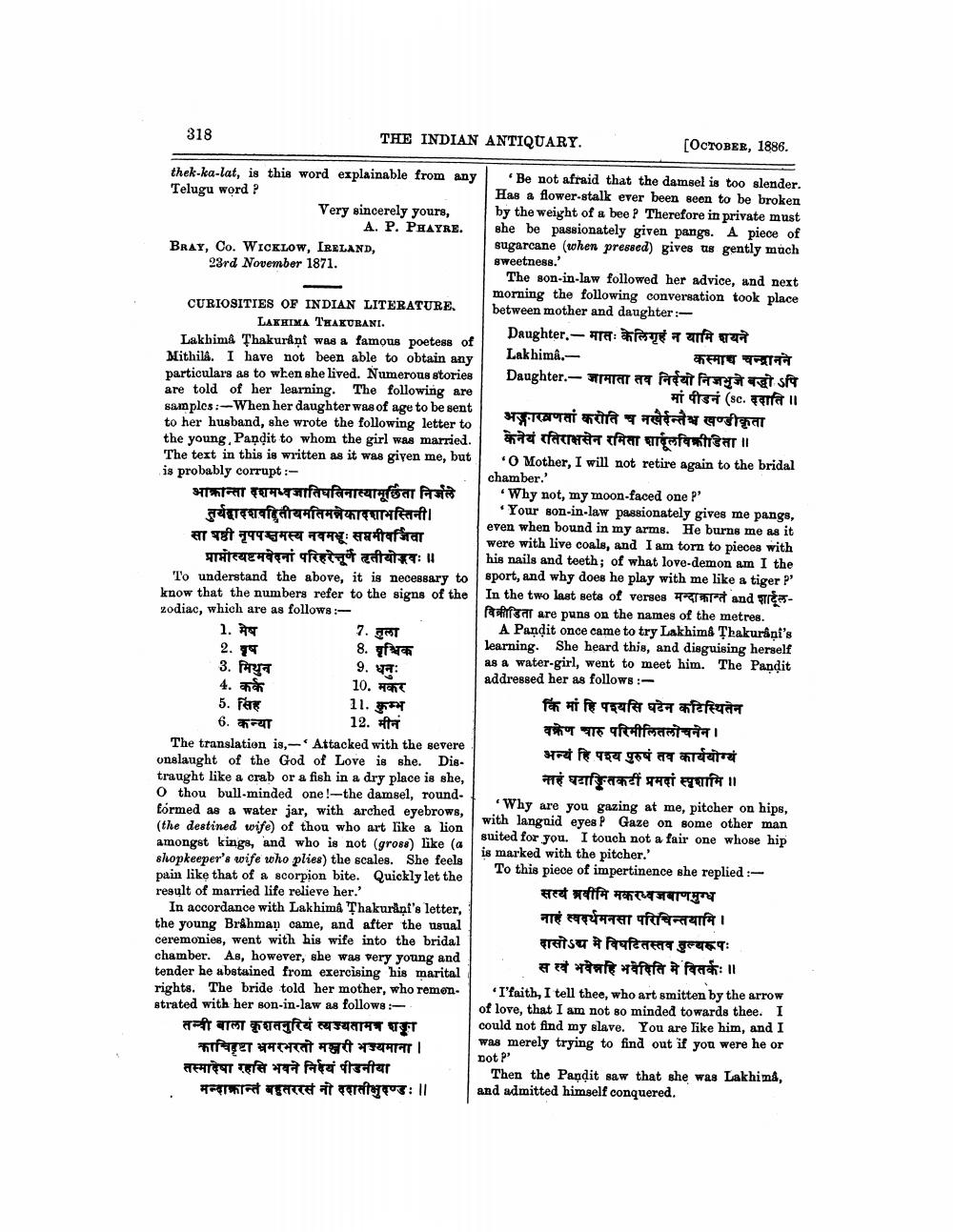________________
318
thek-ka-lat, is this word explainable from any Telugu word?
THE INDIAN ANTIQUARY.
BRAY, Co. WICKLOW, IRELAND, 23rd November 1871.
Very sincerely yours, A. P. PHAYRE.
CURIOSITIES OF INDIAN LITERATURE.
LAKHIMA THAKURANI.
Lakhim& Thakuriņi was a famous poetess of Mithila. I have not been able to obtain any particulars as to when she lived. Numerous stories are told of her learning. The following are samples:-When her daughter was of age to be sent to her husband, she wrote the following letter to the young. Pandit to whom the girl was married. The text in this is written as it was given me, but is probably corrupt :
1. मेष 2. वृष
3. मिथुन
4. कर्क
5. सिंह
6. कन्या
कान्ता दरामध्वजानित्यता निर्मा तुर्यद्वादशद्वितीयमतिमनेकारामस्तिनी । साठी नृपपञ्चमस्य नवमभूः सप्तमीवर्जिता
प्रामोत्यष्टमवेदनां परिहरेत्तूर्ण तृतीयोजवः ॥ To understand the above, it is necessary to know that the numbers refer to the signs of the zodiac, which are as follows:
7. तुला 8. वृश्चिक
9. धनुः
10. मकर
11. कुम्भ 12. मीन
The translation is,- Attacked with the severe onslaught of the God of Love is she. Distraught like a crab or a fish in a dry place is she, Othou bull-minded one! - the damsel, round
formed as a water jar, with arched eyebrows, (the destined wife) of thou who art like a lion amongst kings, and who is not (gross) like (a shopkeeper's wife who plies) the scales. She feels pain like that of a scorpion bite. Quickly let the result of married life relieve her.'
In accordance with Lakhima Thakuráni's letter, the young Brahman came, and after the usual ceremonies, went with his wife into the bridal chamber. As, however, she was very young and tender he abstained from exercising his marital rights. The bride told her mother, who remon strated with her son-in-law as follows:
तन्वी बाला कुशतनुरियं त्यज्यतामत्र शङ्का काचिदृष्टा भ्रमरभरतो मञ्जरी भज्यमाना । तस्मादेषा रहसि भवने निर्दयं पीडनीया मन्दाक्रान्तं बहुतररसं नो ददाती क्षुदण्डः ||
[OCTOBER, 1886.
Be not afraid that the damsel is too slender. Has a flower-stalk ever been seen to be broken by the weight of a bee? Therefore in private must she be passionately given pangs. A piece of sugarcane (when pressed) gives us gently much
sweetness.'
The son-in-law followed her advice, and next morning the following conversation took place between mother and daughter:
Daughter. - मातः केलिगृहं न यामि शयने Lakhimâ.— कस्माच्च चन्द्रानने Daughter.– जामाता तव निर्दयो निजभुजे बद्धो ऽपि मां पीडनं (sc. ददाति ॥ अङ्गारवणतां करोति च नखैर्दन्तैश्च खण्डीकृता केने रतिराक्षसेन रमिता शाहूंनविक्रीडिता ॥
'O Mother, I will not retire again to the bridal chamber.'
'Why not, my moon-faced one ?'
Your son-in-law passionately gives me pangs, even when bound in my arms. He burns me as it were with live coals, and I am torn to pieces with his nails and teeth; of what love-demon am I the sport, and why does he play with me like a tiger Pr In the two last sets of verses मन्दाक्रान्तं and शार्दूलविक्रीडिता are puns on the names of the metres.
A Pandit once came to try Lakhimâ Thakurani's learning. She heard this, and disguising herself as a water-girl, went to meet him. The Pandit addressed her as follows:
किं मां हि पश्यसि घटेन कटिस्थितेन वक्रेण चारु परिमीलितलोचनेन । अन्यं हि पश्य पुरुषं तव कार्ययोग्यं नामानि ॥
with langaid eyes? Gaze on some other man 'Why are you gazing at me, pitcher on hips, suited for you. I touch not a fair one whose hip is marked with the pitcher.'
To this piece of impertinence she replied:--
सत्यं ब्रवीमि मकरध्वजवाणमुग्ध नाहं त्वदर्थमनसा परिचिन्तयामि । दासोऽद्य मे विघटितस्तव तुल्यरूपः स एवं भवेन्नहि भवेदिति मे वितर्कः ॥ 'I' faith, I tell thee, who art smitten by the arrow of love, that I am not so minded towards thee. I could not find my slave. You are like him, and I was merely trying to find out if you were he or
not P'
Then the Pandit saw that she was Lakhimâ, and admitted himself conquered.




